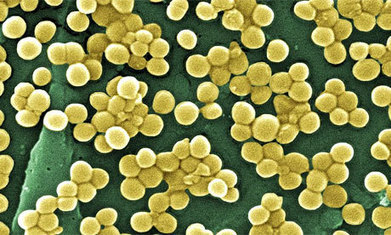Could this be the end of superbugs?
Shu Lam, a 25-year-old PhD student at the University of Melbourne in Australia, has developed a star-shaped polymer that can kill six different superbug strains without antibiotics, simply by ripping apart their cell walls.
"We’ve discovered that [the polymers] actually target the bacteria and kill it in multiple ways," Lam told Nicola Smith from The Telegraph. "One method is by physically disrupting or breaking apart the cell wall of the bacteria. This creates a lot of stress on the bacteria and causes it to start killing itself."
The research has been published in Nature Microbiology, and according to Smith, it's already being hailed by scientists in the field as "a breakthrough that could change the face of modern medicine".



 Your new post is loading...
Your new post is loading...









A high tech alternative to antibiotics? Polymer physically disrupts bacteria, rather than poisoning them...